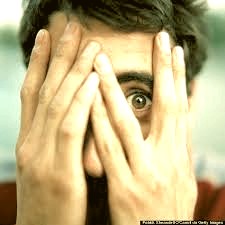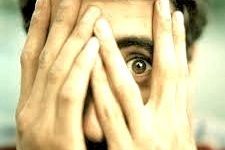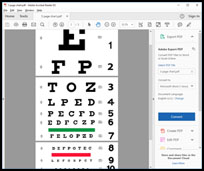Years ago when driving home from a long stressful day at my corporate computer job, over-focused on the traffic with tired eyes behind my -10 hard contacts, a male colleague would regularly pass me. Apparently. I never saw him! He would tease me the next day, saying he waved and I ignored him. My attention was only on getting home safely, fixated on the narrow area immediately around my small car, my peripheral vision unconsciously restricted.
Once at a vision workshop in a rural setting, soon after I’d started to put some attention on improving my limited eyesight, I was up very early, so went to the kitchen for a cup of tea. The male cook greeted me, pointing outside the window for me to notice a baby deer close by, grazing on the shrubbery. “Oh, I can’t see that far” I replied, before I even looked! Later I realized how this self-limiting attitude was hurting me. What other visual delights was I missing, only because I wasn’t looking?

In the years since, I’ve improved my vision considerably, and am calmer overall. I like to think I’m more observant than I used to be, my visual attention steadier, not darting around like I’m a frightened rabbit. And I can still miss things. A friend just posted a photo of some of us in a shuttle riding to the airport together after an energy workshop, talking happily about what we’d learned. Someone else commented that the shuttle driver had had a good time too, and that he had shouted a cheery “Goodbye Nancy!” as he let me off at my terminal entrance. This was a complete surprise to me! I was already worried about getting through security and finding my gate, not fully present.
I’ve written before about vision and attention, here. The longer I study and practice vision improvement, the more convinced I am that it’s more about the mind than the eyes. It’s a daily and hourly goal of mine now to pay attention to what’s happening right here in front of me. I’m not doing this desperately, like I’m about to fail some big test if I miss something, but in an interested curious way.
Life is made of moments, each one rich with feeling and color and some kind of music, even if it’s only the lawn mower outside the window or the breeze rustling the leaves. I don’t want to miss any of it, after spending my earlier life closed off behind thick eyeglasses, interacting with as few people as possible. Are you paying attention to the simple wonders around you? Your eyes were made to see miracles every day — don’t let your distraction or worry prevent them from doing that. Life is a visual banquet. Eat up!
I wore strong glasses, then contact lenses, from age 5 into my 40s. While making many mistakes, eventually l learned how to improve the way I use my eyes and to see in a more relaxed, healthy manner. It is my pleasure to coach others to do the same. Visit me at https://NancyLNeff.com.


Especially would love to make your last sentences into a quote that can be passed on.
Your eyes were made to see miracles every day — don’t let your distraction or worry prevent them from doing that. Life is a visual banquet. Eat up!
Sight itself is miraculous. No-one can explain it. The things we take for granted…
Darrel, I agree. I’m grateful for my eyesight every day, even when it’s blurry.
Teresa, thanks so much! Go ahead and make it into one of those colored quote boxes if you wish, just give me credit.
Hi Nancy,
Just thought that I’d leave a quick note that ever since I stumbled across this blog I’ve read and reread many of your posts – I find them very enlightening and reassuring, since much of what you recount parallels my own experiences, sometimes throwing a slightly different light on them So – thanks for sharing all this!
So – thanks for sharing all this!
Roman
Hi Roman, and thanks so much for your comment. Yes, even though everyone’s vision condition is unique like we all are as people, there are commonalities, and the way I look at things may help you too. Keep up the good work!
may help you too. Keep up the good work!
Hi Nancy,
I am -7.25 in my right, -5.25 in my left. My axes are -135 and -165. I’ve making a conscious effort to relax by eyes through various activities. Would you give the shirt and long of nearsighted folks who through the Bates’s method see improvements?
I ordered my training glasses, but I had trouble seeing properly due to the strain my eyes. So, I ordered another pair in the hope that the newest will make eyes strain less.
Question two: I have a floater in my left. How have others with floaters managed to lessen or eliminate them?
My thanks.
Evelyn Begay
Evelyn, hi, and good for you for wanting to improve your vision to a healthier state. First, I am not an eye doctor and can’t legally prescribe glasses for anyone. If your reduced prescription glasses strain your eyes, yes, they’re not helping you. Wear only glasses you can see through comfortably, and take them off and see with your unaided vision whenever you can and it’s safe.
Here’s something I wrote a while back about floaters, which may help: https://www.iblindness.org/1503/how-do-i-get-rid-of-my-floaters/.
Darrel, yes. I agree with both of your points. Eyestrain can creep up on us so subtly we don’t often notice it until it’s severe. A lot of vision improvement is about awareness — how do your eyes and visual system feel now? And now? OK isn’t really good enough. Wouldn’t we all like seeing to feel wonderful?
Nancy, it was interesting to read about you not noticing things in your peripheral vision this has happened to me too. I think it is very common for people who wear glasses and contacts to get used to look straight through the centre of these devices, and even after some of us take them off to improve our vision, these bad habits may persist for some time.
Also I think that for many people who are straining to see through glasses and contacts it actually hurts them to force their eyes to look at what’s going on in the peripheral field of view and so they don’t do it.
Thanks
Darrel